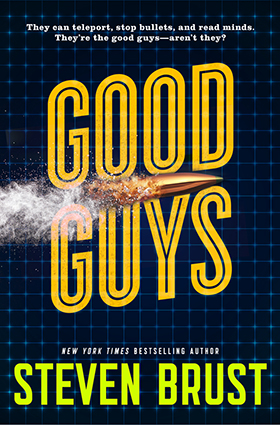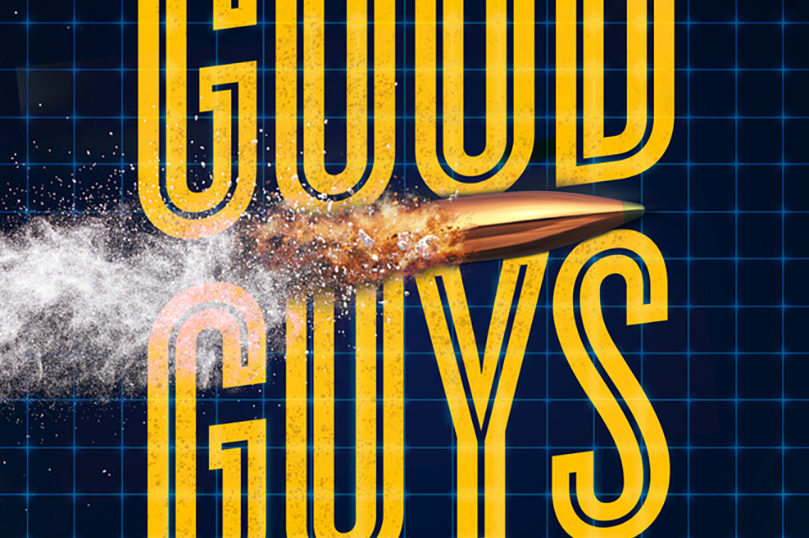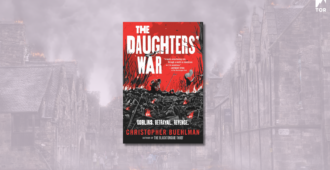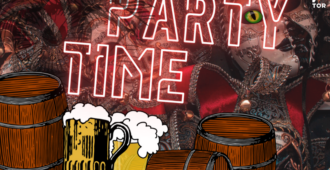 Donovan was shot by a cop. For jaywalking, supposedly. Actually, for arguing with a cop while black. Four of the nine shots were lethal—or would have been, if their target had been anybody else. The Foundation picked him up, brought him back, and trained him further. “Lethal” turns out to be a relative term when magic is involved.
Donovan was shot by a cop. For jaywalking, supposedly. Actually, for arguing with a cop while black. Four of the nine shots were lethal—or would have been, if their target had been anybody else. The Foundation picked him up, brought him back, and trained him further. “Lethal” turns out to be a relative term when magic is involved.
When Marci was fifteen, she levitated a paperweight and threw it at a guy she didn’t like. The Foundation scooped her up for training too.
“Hippie chick” Susan got well into her Foundation training before they told her about the magic, but she’s as powerful as Donovan and Marci now.
They can teleport themselves thousands of miles, conjure shields that will stop bullets, and read information from the remnants of spells cast by others days before.
They all work for the secretive Foundation…for minimum wage.
Which is okay, because the Foundation are the good guys. Aren’t they?
Good Guys will be available March 6th. Please enjoy this excerpt.
CHAPTER 1: The List
The first one on the list was Georgio Byrne Lawton-Smythe. I found him at the Maumee Grill on Mulberry and Fifth, just south of the river. There was no good way to talk to him, under the circumstances, but that didn’t bother me. Nothing he said would have made any difference to me, and nothing I said would have made any difference to him. Or to put it another way, I didn’t hate him enough to bother. I just walked up to him and put three 12-gauge solid slugs into his chest, like, blam cha-chink blam cha-chink blam. Then I dropped the shotgun, walked out the door, and turned left. I threw my gloves into the river and hiked all the way to East Broadway before I caught a cab to bring me back to Toledo and my hotel.
Just after 2:00 East Coast time on Thursday morning, Donovan Jackson Longfellow initiated a Skype call to Marci No-Middle-Name Sullivan. She came on quickly enough that he could be pretty sure she’d been awake and at her computer, so he didn’t bother asking if he’d interrupted anything.
“We caught one,” he said without preamble.
“Oh, my.”
“Yep. Ready to go into action?”
She might have nodded, but then remembered how hard it was to make out gestures on Skype, so she said. “Yes, sir.”
“Don’t call me sir. My name is Donovan, or Don, or Donny.”
“All right. How does this work?”
“You ask me what’s up, and I tell you what we know.”
“Um. Okay. What’s up?”
“West Nowhere Ohio, a place called Perrysburg. Guy torn in half with a shotgun.”
“A shotgun? That doesn’t seem like, you know, our kind of thing. I speak under correction, of course.”
“Yeah, you’ll stop doing that soon. Here’s what we know: It happened in a restaurant in the middle of dinner hour, there were plenty of people there, and no one saw anything.” Before she could ask, he elaborated. “I don’t mean couldn’t ID the shooter; I mean saw nothing. One second everything is fine; next second there’s a dead guy messy on the floor with a shotgun next to him and blood spreading out and all the nice people freaking out and throwing up. The PO-lice are stumped, and Upstairs is talking nightmare scenario. Of course, they do that all the time, so I figure mildly troubling dream scenario until proven otherwise. But we still need to check it out.”
“How are they explaining it? I mean, the police.”
“They figure everyone was shocked by the horror of it all, or some shit. Customers and staff are under scrutiny. They won’t get shit that way.”
“So the police believe it was someone in the restaurant?”
“What else could they believe? But the important thing is that we don’t believe it, so we need to investigate.”
“Do we know who the victim is?”
“Name hasn’t been released. Upstairs has ways of getting past that, but they’re still working on it.”
“Okay,” she said. “Just you and me?”
“I’m also calling in the hippie chick, because it’s better to have her and not need her than, you know.”
“Hippie chick?”
“Susan.”
“Oh! I know her. She’s the one who pulled me out of the kiddie pool.”
“Right.”
“So, now what?”
“Now you ask how you’re supposed to get there.”
“All right. How do I get there?”
“Um, yeah, good question. Let me think.” Donovan weighed the pros and cons of delaying half a day, went through an imagined conversation with Oversight, and said, “You’ve been checked out on your slipwalk, right?”
Marci might have nodded again, but then said, “Yes.”
“We’ll go that way, then. The scene is already two days old. Can’t expect you to sense it if we wait another twelve hours for travel.”
“Two days?”
“A bit more.”
“I probably won’t get anything as it is. Why so long?”
“Access. The crime scene is still closed, but they’ve stopped guarding it.”
“Oh. I don’t know how these things work. Couldn’t the Foundation have pulled strings and gotten us in earlier?”
“They probably don’t think it’s important enough to pull the big guns out. It’s critical and could mean the end of the world, but we can’t spare any resources. That’s sort of how things work.” He shrugged, though she wouldn’t see it. “I don’t know. That’s above my pay grade.”
Marci muttered something non-committal.
“Look,” said Donovan. “Don’t sweat it, all right? We go in, check it out. You get something or you don’t, I report to Upstairs. If you get something, we try to figure out what it means. If not, I go back to Internet hearts, Hippie Chick goes back to organic gardening, and you go back to whatever it is you do.”
“All right. I just hate it when—all right.”
“Also, what are you wearing?”
“What? Seriously?”
“Yeah.”
“Is there a dress code?”
“Kind of. Business casual is all right, or jeans and T-shirt.”
“What isn’t all right?”
“Don’t look like you’re going clubbing.”
“Is this really a thing?”
“Look. It matters. There are practical reasons.”
“What practical reasons?”
“You’ll figure it out.”
“I—all right. I’ll trust you on that. For now.”
“Thanks.”
“Anything else?”
“No, that’s it.”
“Are you calling Susan or am I?”
“I am.”
“Does she really do organic gardening?”
“Wouldn’t surprise me. The place is called the Maumee Grill.” He started to give her the whole command line for the slipwalk, but decided it was disrespectful. If she ended up in Greenland or something he’d regret it, but she was now on his team, so he’d assume competence until it was proven otherwise. “I’ll meet you outside the yellow tape. See you in an hour?”
“An hour,” she said, and he disconnected.
He made the next call, which took a little longer to connect. Susan Dionisia Kouris eventually appeared. Even though it was before midnight in her time zone, she looked more than half-asleep. She was wearing a blue terry-cloth bathrobe.
“Sorry to wake you up,” he said.
“Ugh,” she explained.
“Need some time?”
“No, it’s all right. I’m at the tail end of a chest cold. I’m trying to sleep it off. We have something?”
He nodded. “Yeah. A body. Up for it?”
“Always. I’ll take a decongestant.”
He gave her what details he had and hung up.
Donovan stood up and stretched, then put his coat on—the ugly-but-warm fleece-lined one. He also put on a stocking cap, because sometimes when it’s cold you just have to sacrifice looks for survival, or comfort at any rate.
He checked his pockets to make sure he had his wallet, knotnot, latex gloves, and blackjack. He was unlikely to need the blackjack, especially with Hippie Chick there, but he felt naked without it. He left the apartment, took the elevator to the basement, and let himself into the laundry room.
Building management had thoughtfully provided the tenants with a washing machine and two dryers, one of which sported a sign that said: “Out of order.” He switched that one from “high heat” to “air dry,” then set the timer to 8 minutes, then moved it to 31 minutes, then to 19 minutes, then to 39 minutes. He switched it from “air dry” to “high heat” and stepped to the side. The dryer swung back, taking a section of wall with it. Donovan went into the stairwell it had revealed, lit by a single fluorescent bulb, and pulled the wall shut behind him. He said in a clear voice, “Outside the Maumee Grill, Perrysburg, Ohio, USA.” Then he went down the stairs. After about ten steps, the hallway dissolved.
Aw shit, he thought just too late. Did I leave the milk out?
It was full dark in western Ohio. Once the ground stopped turning, he looked around to make sure he was alone. The temperature wasn’t bad, but there was a wind that stung his face. He took a long sniff of the air: stale fryer oil and river. He walked around the building, staying outside of the crime scene tape; after a good look, he slipped under it. I have now broken the law, he thought. Gosh gee.
The main door was closed by more than bureaucratic theory—there was a particularly heavy padlock there: an Abloy PL 362. He recognized it because it was the same one he used for the closet where he stored his gear. Using it here was pure idiocy—yeah, it was hard to get past; the knotnot might even be inadequate—but there were windows all around the place, and, in particular, four windows into the kitchen and a door in back that wouldn’t stand up to a pry bar, or even a decent screwdriver.
He shrugged and went around back and put the latex gloves on. He didn’t have a pry bar or a screwdriver, but he did have a gift from the good folks in the Burrow: a device that looked like a cheap ballpoint pen, because that’s what it used to be, and that he called a knotnot. He pointed it at the back door and said the magic words: “Open, you piece of shit.”
The door gave out a click. He turned the knob and went inside.
Forty-five minutes later he was back outside, in time to see Susan appear as a two-dimensional image that, even if you knew what was going on, made you think, Wait, has she been there the whole time? The image filled out so there was no question; Susan looked around and found him.
“Hey, Hippie.”
“Hey, Laughing Boy. You went in, didn’t you?”
“Just for a look-see.”
“Because protocol is for other people, and there was no chance of you being interrupted and, like, arrested or shot or something?”
“Do you see anyone around? Any PO-lice cars?”
“Not the point and you know it.”
“How’s the cold?”
“I’ll live,” she said, and sniffed. In person, her eyes were certainly bloodshot, but he wasn’t her nurse. If she’d been too sick to take the job, she could have said so.
She glanced around, then looked a question at him.
“Soon,” he said. “If she doesn’t screw it up.”
Susan nodded, and they stood there in silence, waiting.
A minute or two later, Marci appeared, stumbling a bit. Everyone stumbled at the end of a slipwalk, except Hippie Chick, because she was a freak. Marci smiled a little hesitantly to him and Susan. “That was weird. And kind of fun.”
“Yeah,” said Donovan. “Bad news is, you’ll get used to it.”
“Except the climate changes,” said Susan. “That always catches you by surprise, even when you’re expecting it. And you can get a cold from the temperature shifts if you do it too much.”
“Is that what happened to you?”
“This? No, this is just Oregon winter.”
Marci nodded and turned to Donovan. “Have you learned anything new?” she asked.
“I couldn’t learn anything new without going inside, which protocol forbids without the full team.”
“Oh. Right. Sorry.”
“As it happens, I don’t give a shit for protocol. So here’s what I got: Blood spatter tells us that the victim didn’t move, and the PO-lice report Upstairs passed on says that he was shot three times. If you work out the timing on three shots from a pump-action shotgun, it means something was holding him still. Dropping the weapon at the scene—and right there next to the victim’s table—would usually indicate a professional killer, or someone who planned the whole thing out in detail and was cool enough to follow through with it.”
“Usually?” said Susan.
Donovan nodded. “Thing is, shotgun slugs can’t be identified. Either he doesn’t know that, which means he’s new at this, or he had another reason to drop it. No witnesses report cars leaving the lot afterward. There was a duffel bag just outside the door, and they found traces of gun oil in it.”
He paused for a breath and to see if there were questions yet, then continued.
“So he walked from—somewhere—holding a shotgun in a duffel bag. He dropped the bag, came in, did his thing, dropped the gun, walked out again all with no one seeing anything. Or hearing anything.”
“No one heard anything?” said Marci. “No one heard the shotgun fire?”
“Correct.”
“So it wasn’t just invisibility.”
“Right.”
“Maybe a combination of—no, I shouldn’t speculate. Let’s go in. From the sound of it, it was a major working, so there could still be traces. And we’re far enough from a grid line that it might not have covered it over.”
Donovan nodded as if he understood that—well, he sort of did, in theory—and indicated the way around the back. Susan led, because protocol; Donovan at the back. This was in case of danger that didn’t exist, but it was silly to argue about. Marci walked almost in a straight line, like she wanted to put one foot directly in front of the other, giving her a strangely dainty stride that reminded Donovan of cartoon Japanese women. Susan walked like someone you didn’t want to tangle with, but a lot of that was that she didn’t swing her arms at all, which gave her a sort of threatening aspect. And the rest was because Donovan knew her.
They reached the back door. “Gloves,” he said, “if you plan on touching anything. I have extras.”
“I shouldn’t need to touch anything,” said Marci.
Susan pulled out her own gloves and put them on without a word.
“Okay,” said Marci once they were inside. “I’m going to see what I can find. Can you two wait here?”
Donovan and Susan remained by the door to the dining room. “Watch the crime scene markers,” he said.
“I know.”
Marci walked up to the blood spot, stopping just short of it—it was big. There’d been a lot of blood. Donovan and Susan waited while Marci investigated her way.
“Well,” she said a moment later. “This is quite something.”
“What—”
“I hope you didn’t have any plans,” she said in a suddenly all-business voice. “This is going to take a while.”
“If I had a life,” said Donovan, “I wouldn’t be here.”
Hippie Chick nodded beside him.
Around 6:00 AM, Donovan stepped out of the laundry room, took the elevator back upstairs to his apartment, put his coat away, returned the blackjack and the knotnot to the closet (no—that shelf, you idiot, so you’ll remember it’s been used), and sat down at his computer. He brought up Skype, and selected a name. The face that appeared was a pasty, sickly white as of someone who never went outside—you could even tell through the distortion. The man was clean-shaven and bald save for a fringe of light brown hair, and was wearing a white shirt and thin, dark tie. His collar looked very tight.
The man on the screen said, “Good afternoon, Mr. Longfellow.”
“It’s morning here, Mr. Becker. Very early morning, after a very late night.”
“Report, please.”
“He used a time-stop. And he used it over a wide area—he covered the whole building so he wouldn’t be seen even in the parking lot.”
“That’s a lot of power, Mr. Longfellow. I trust you’re certain it was a time stoppage, and not high speed?”
“Marci is sure, so I’m sure. There was also a gradual release, so it covered up the sound of the shots.”
“Explain that, please?”
“Marci says if the time-stop releases gradually, the sound will be whole octaves lower than usual, and drawn-out, and the human ear won’t pick it up.”
“I’m not certain I understand, Mr. Longfellow.”
“Nor am I, Mr. Becker.”
“Very well. Did this take place close to a grid line?”
“None within half a mile.”
“That is extremely impressive.”
“Yeah.”
“What else?”
“Shotgun, three to the chest, just like the PO-lice say. From under a foot away.”
“How did the shooter cut through the air?”
“Uh, what?”
“If time has stopped, surely that means the air molecules are also stopped? So how did the shooter get past them?”
“Oh. According to Marci, a time-stop field takes effect an inch or so from the caster, otherwise he’d have stopped himself. I hadn’t thought about the air movement thing.”
“An inch from the caster, Mr. Longfellow? But the barrel of the gun is farther away than that.”
“Yeah, I asked about that. If the caster is in contact with the gun, the gun is part of the field; otherwise it wouldn’t fire.”
“I see. Ms. Sullivan. It sounds like she’s working out.”
“It was her first case. But yeah, I think so. She knows her stuff.”
Becker was silent for a moment, then said, “Take me through the events.”
“All right. I’m going with ‘he’ for now, because a man is more likely to use a shotgun. Marci didn’t get any personality indicators—which says something by itself. Anyway, yeah. He arrives, walking, at about six fifty PM local time. No sign of magical travel of any sort, although after two days that doesn’t prove anything. He casts a time-stop from about twenty feet from the door. He goes in. Dining room has seating for fifty-six, and it’s about half-full. Or half-empty, in your case, Mr. Becker.”
Becker didn’t appear to hear that; Donovan went on.
“He walks up to the table and shoots three times. Now here’s the thing: Marci figures that as soon as the slug clears the barrel, it hits the time-stop. Like, if you’d been able to watch, you’d have seen the slug freeze in midair, and then the next, and then the next. Which is why it looked like the guy didn’t move when he was hit—in effect, when the time-stop released, all three slugs hit him at the same instant.”
“And yet, you said the time-stop was released gradually.”
“Gradually, Mr. Becker, meaning over the course of about a second subjective time.”
“I see. And speaking of, is there any way of knowing the elapsed subjective time for the shooter?”
“Marci says that time-stop, at best, doesn’t last very long, and takes a lot of concentration to maintain. I can’t imagine he spent more time than he had to. And there are no reports of anyone in the place having a watch that’s suddenly off. All in all, I’d guess about a minute. Not more than two. I should add, this is from historical reports; she says that no one has been able to perform that spell in over two hundred years. It’s a fluke talent, like direct flying or becoming discorporeal.”
“Thank you. I believe I’m caught up.”
“Have you managed to learn anything about the victim?”
“Yes, some things have come in.”
“I’m listening.”
Becker may have nodded—it was hard to be sure. “Our victim wasn’t a very nice man, Mr. Longfellow.”
“Very not nice?”
“Yes.”
“So we might be dealing with a personal grudge, or a vigilante?”
“Either one is possible. We know that the deceased, a Mr. Lawton-Smythe, emigrated from Bristol, England, ten years ago and took a tenure-track position at the University of Toledo. Married to a professor of modern languages, two children, aged fourteen and eleven.”
“What did he teach?”
“English literature and philosophy, with a specialty in Heidegger.”
“Sounds pretty evil.”
“You’ve never heard of Heidegger, have you, Mr. Longfellow?”
“Not as such. Does it matter?”
“Probably not. More significantly, Lawton-Smythe had ties to the Roma Vindices Mystici.”
Donovan sat back. “Why would they want someone in western Ohio?”
“Why would we want someone in New Jersey?”
Donovan took the point: They didn’t particularly want someone in New Jersey—that’s just where he lived.
“What sort of ties?”
“He was a sorcerer. Not especially strong, but still. A sorcerer, and one of theirs.”
“Do we have him for anything?”
“In England he was responsible—indirectly, of course—for random beatings of Pakistanis, and some football hooliganism.”
“Football hooliganism. Is that a thing?”
“It’s the game you would call soccer, and yes.”
“Did he have a reason? I mean, other than being a prick?”
“If by ‘being a prick,’ Mr. Longfellow, you mean being an extreme racist, none we are aware of.”
“What’s he done since he came here?”
“Nothing we’ve found so far, but we’re still looking.”
“You said he wasn’t very strong.”
“Just mental and emotional effects—suggestions, mood altering. But good at it. In England, you might say he did a great deal of damage on a small scale, if that makes sense.”
“What did he do for the Mystici?”
“We don’t know exactly. If I had to guess”—Becker said this as Donovan might say, If I had to stick my hand into sewage—“I would say that they brought him in when they needed subtle manipulation done.”
“All right. So, how do I find the shooter?”
“You’re asking me, Mr. Longfellow? That’s your specialty.”
“All we know is that he’s willing to throw away a shotgun. I need something to go on.”
“Such as?”
“A sorcerer who can do a time-stop over that much of an area must have left traces somewhere. Where did he get his training? Or, to put it another way, is he one of ours, one of theirs, a renegade, or a weirdo? Odds are good he’s one of theirs—Marci is sure we don’t have anyone with that talent. If that’s true, it’s one of theirs attacking others of theirs. That means talking to them and convincing them to cough up information, and that’s your department, Mr. Becker. Although one other possibility comes to mind.”
“Go on.”
“A powerful spell, cast half a mile from the nearest grid line, using a spell no one has been able to do in generations. What does that suggest to you?”
“Ah. Yes. It is possible. Good idea, Mr. Longfellow. I’ll have our people look into it, though we’re unlikely to have a positive quickly, and of course we’ll never have a definitive negative. What will you be doing in the meantime?”
“I’ll be sleeping, Mr. Becker. After that, my niece is having her sixth birthday, and I haven’t gotten her anything.”
“Please, Mr. Longfellow.”
He shrugged, even though Becker wouldn’t see it. “We got what we could get. Now we wait for you to find something, or for something else to happen.”
“Something else, Mr. Longfellow? Such as what?”
“Another killing, Mr. Becker.”
“You think there will be more?”
“I have no idea. It’s a trade-off, I guess. More killings will make our shooter easier to find.”
“You are very cold-blooded sometimes, Mr. Longfellow.”
“You would know, Mr. Becker.”
It seemed on the screen as if Becker may have smiled a little. Donovan closed Skype, then stared at his computer’s wallpaper—a British Columbia lake reflecting mountains that looked like it should be on a beer can—for a good five minutes. Then he got up, found the milk, sniffed it, and put it in the refrigerator.
Manuel Becker stretched his legs, then stood up. He could have phoned, Skyped, emailed, or sent a memo, but he always preferred to ask favors in person. He took the elevator up to the Burrow. Many Foundation members, over the years, had remarked with amusement that the Burrow was actually on the second from the top floor; Becker was not one of them. Many had also, on the way to the Burrow, stopped to admire the view of Paseo del Prado through the window opposite the elevator. Becker wasn’t one of those, either. He just stepped out of the elevator and went down the hall to the room labeled, in Spanish, German, English, Russian, French, Mandarin, Farsi, and Hindustani, “Artifacts and Enchantments.”
The department secretary, a young man named Anthony, did a credible job of appearing to snap to attention without moving. “Mr. Becker,” he said in American-accented English. “How can I help you?”
Becker had years ago given up on trying to convince him to speak Spanish; it was one of few things he had ever given up on. He nodded. “Hello, Anthony. Is Ms. Ramirez available?”
“I’ll check, sir.”
Anthony picked up the desk phone, punched a button, and waited. After a moment he said in Spanish, “Julia? Mr. Becker from the Ranch—I mean, from I and E—would like to see you, if you have time. . . . All right.”
Anthony hung up, and said in English, “Just go on back, sir.”
Becker nodded and did. Julia Ramirez stood up from her desk as he approached. She was wearing a red dress that matched some of the appalling fake gemstones on her glasses. “Mr. Becker,” she said in a thick but pleasant Catalonian accent. “Please, have a seat.”
Her L-shaped desk held a computer with a pair of monitors, and a picture of her husband and their two boys, both in the eight-to-ten range; the picture was new since the last time Becker had been to see her. He did not remark on it. He sat down opposite her and said, “Thank you for making the time, Ms. Ramirez.”
“Of course. How can I help Investigations?”
“We have an unusual case, Ms. Ramirez. A sorcerer has used a time-stop to commit murder.”
Ramirez nodded. “Go on.”
“It was cast in a place far from a grid line. This makes us wonder if an artifact or a device of some sort could have been used.”
Her brows—pencil thin and artificially darkened—came together. “We have no such device, nor the capability of making one.”
“Yes. My understanding is that none of our people are able to cast it.”
“That is correct. If the Mystici do, they are keeping the secret well guarded.”
“I understand. But something from antiquity?”
“Well, of course, it’s possible. But I’ve never heard of anything with that enchantment on it.”
Becker nodded. “Could I trouble you and your team to do some research? If there is, or was, such an item, and it has been found, it could help us identify the individual responsible.”
She flashed a quick, uncomfortable-looking smile. “Of course, Mr. Becker. We’ll start at once.”
“Thank you, Ms. Ramirez.” He stood up. “I look forward to hearing from you.”
He gave her what hoped was a friendly smile, and left, only vaguely aware of how the entire room seemed to emit a sigh of relief as the door closed behind him.
Copyright © 2018 by Steven Brust
Order Your Copy











